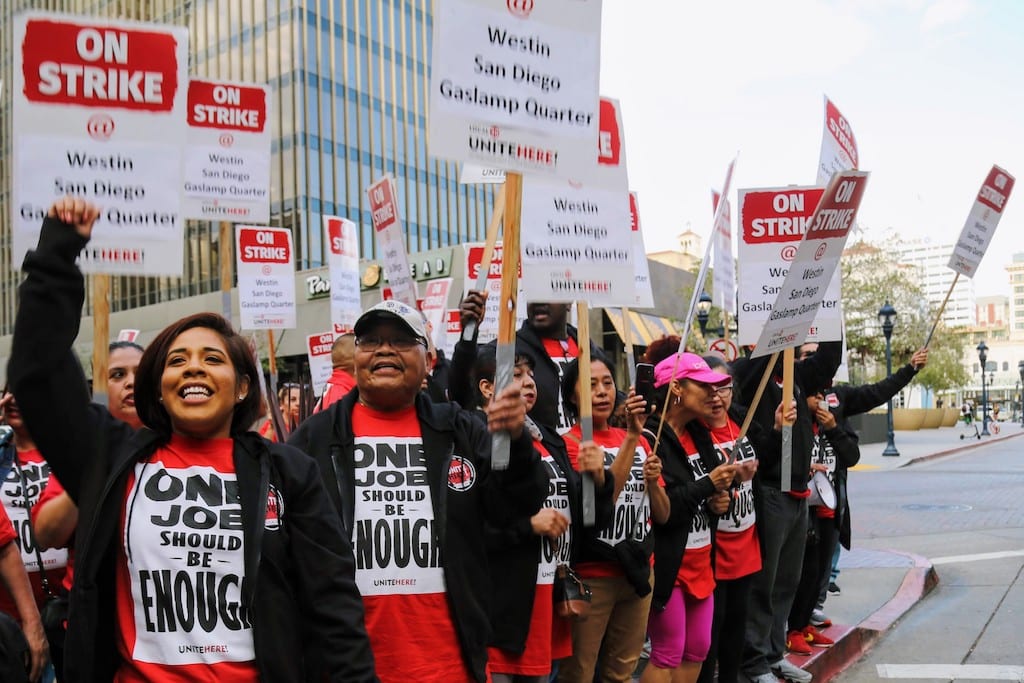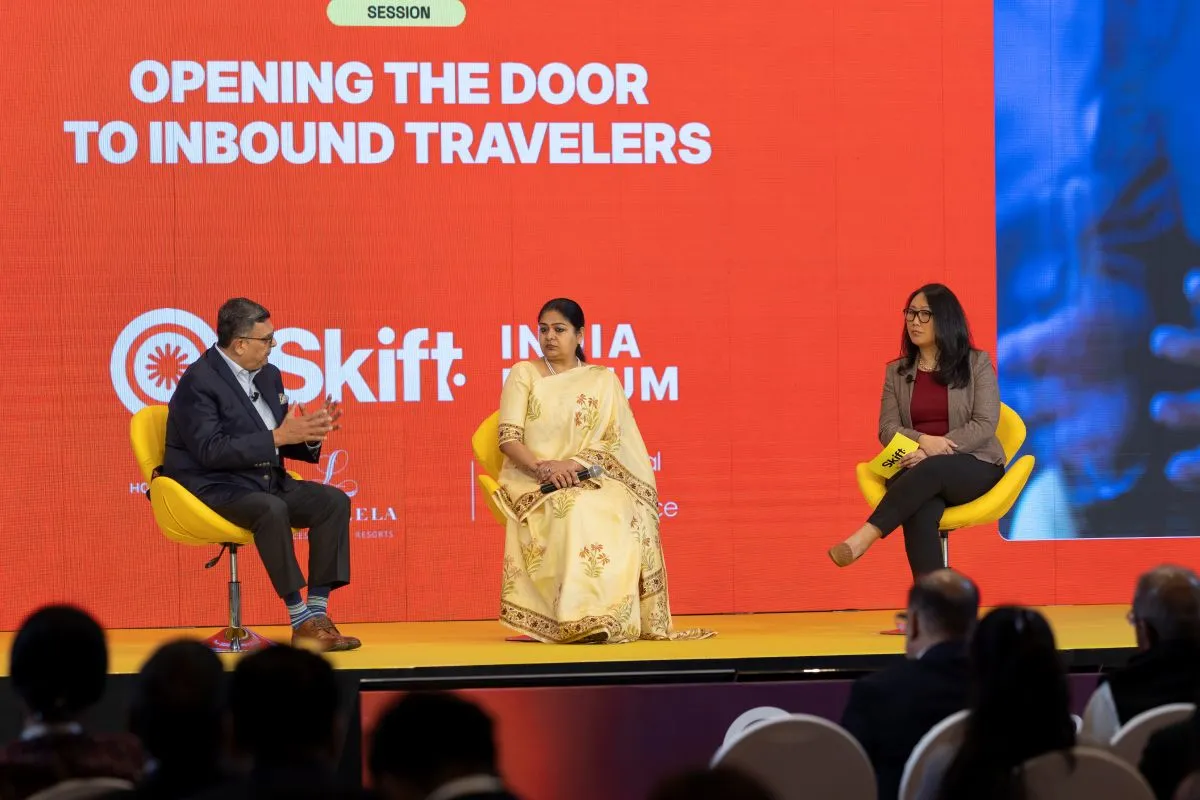How Big a Problem Are the Growing Worker Strikes for Marriott?

Skift Take
Labor union strikes against hospitality companies are not uncommon.
But the more than 7,700 striking Marriott employees represented by Unite Here, working in states that range from Hawaii and California to Michigan and Massachusetts, are demonstrating a growing problem — not only for Marriott, the world's largest hotel company — but for the general hospitality industry in the U.S.
That problem? The growing desire among workers throughout the historically low-wage hotel and service industries for better pay and increased security measures, and corporations having to face the consequences of not meeting those needs.
The union Unite Here represents approximately 20,000 Marriott workers, and nearly 40 percent of them are currently on strike. The strikes began in late September, after Unite Here contracts with various Marriott hotels across the U.S. began to expire in July and August of this year. The number of work stoppages at Marriott properties is growing, and beginning to impact guest services and potentially planned meetings and events at the hotels.
This strike — one of the largest multi-city hotel workers' strikes in the U.S. in recent history that is impacting 23 different hotels — might be targeting only Marriott hotels at the moment, but other hotels and brands may face similar labor strife in the coming years.
"The reaction we've had from the rest of the industry is relief that they're not the ones who are being targeted by this strike," said Rachel Gumpert, national press secretary for Unite Here. "But I think that what they might be missing is that we're absolutely coming for the whole industry. We're starting with the biggest and the richest hotel company and after that we are absolutely going to ensure that all the other hotel companies are giving workers enough pay so they're able to work with dignity."
Skift reached out to Marriott for comment on the strike and received the following statement from a Marriott International spokesperson: "We are disappointed that Unite Here has chosen to resort to a strike at this time. During the strike our hotels are open, and we stand ready to provide excellent service to our guests. We continue to bargain in good faith for a fair contract. While we respect our associates' rights to participate in this work stoppage, we also will welcome any associate who chooses to continue to work."
The Immediate Impact of the Strikes
The following is a chart of all the impacted hotels where Unite Here members are currently on strike:
| Destination | Hotel Name |
|---|---|
| Detroit | Westin Book Cadillac Detroit |
| Boston | Aloft Boston Seaport |
| Boston | Element Boston Seaport |
| Boston | The Ritz-Carlton, Boston |
| Boston | Sheraton Boston |
| Boston | W Boston |
| Boston | Westin Boston Waterfront |
| Boston | Westin Copley Place, Boston |
| Oakland | Oakland Marriott City Center |
| San Diego | The Westin Gaslamp Quarter San Diego |
| San Francisco | San Francisco Marriott Union Square |
| San Francisco | Palace Hotel |
| San Francisco | W San Francisco |
| San Francisco | Westin St. Francis Union Square |
| San Francisco | San Francisco Marriott Marquis |
| San Francisco | Courtyard by Marriott San Francisco Downtown |
| San Francisco | St. Regis San Francisco |
| San Jose | San Jose Marriott |
| Honolulu | The Royal Hawaiian |
| Honolulu | Sheraton Maui Hotel |
| Honolulu | Moana Surfrider, a Westin Resort |
| Honolulu | Sheraton Princess Kaiulani |
| Honolulu | Sheraton Waikiki |
Source: Unite Here
The nationwide strikes, which have impacted seven different hotels in the city of San Francisco alone, have even prompted the city's mayor, London Breed, to get involved. On Saturday, Breed said she would meet with local Unite Here leaders representing the 2,500 San Francisco-based Marriott employees who have gone on strike.
In most of the hotels where workers have gone on strikes, nearly all of the hotels' employees are protesting, except for managers, Unite Here's Gumpert said.
And in hotels where other hotel workers are being represented by other unions, such as Teamsters or the International Alliance of Theatrical Stage Employees (IATSE), those unions have informed their respective members not to cross picket lines.
The result is that guests staying in those hotels where Unite Here members are on strike are seeing the immediate impact of the strikes in the form of limited services that include housekeeping, dining, and pool services.
In a letter addressed to guests, the general manager of the Westin San Diego Gaslamp Quarter informed guests it would put its Make a Green Choice program "in effect for all guests for the duration of the work stoppage. Your room will be cleaned every third day of your stay, and any additional cleaning services you would like are available on request."
A quick glance at recent TripAdvisor reviews of The Ritz-Carlton, Boston shows that the labor strikes are having an impact on guest experience.
One reviewer wrote, " … there was zero lounge service, zero room service, zero flexibility to have an extra hour of check out time." Another said, "The normal services you associate with a hotel were severely reduced, along with the attention provided with a RC [Ritz-Carlton] stay, were no longer available."
In addition to impacting the experiences of individual hotel guests, labor strikes of this magnitude could seriously derail meetings and events that take place at those properties as well. Unite Here's website related to the strike even includes a PDF form for meeting and event planners to use to "protect" their events in the event that labor disputes prevent them from holding their meetings or events.
What Unite Here Is Asking of Marriott
Unite Here viewed the various Marriott contract expirations this summer as "a moment to challenge the biggest hospitality company in the world and to call on them to be a leader" when it comes to workers' wages and security, Unite Here's Gumpert said.
The majority of the hotels where contracts expired were former Starwood Hotels & Resorts' branded properties, whom Marriott inherited when it acquired Starwood for $13.3 billion back in 2016.
Since acquiring Starwood, Marriott now has more than 6,700 hotel properties worldwide, and a market capitalization of more than $40 billion, which is nearly twice that of its nearest U.S. hotel competitor, Hilton, which has a market capitalization of $21.9 billion.
Specifically, what Unite Here is asking of Marriott is for the following three things: (1) Wages high enough so that workers do not have to work multiple jobs to earn a living wage; (2) a voice in determining how much automation and what kind of automation makes its way into the hotel industry; and (3) better measures for workplace safety.
"Wages have to go up for one job to be enough," Gumpert said. Unite Here is not advocating for a standard minimum wage of $15 as other organized labor groups have pushed for, but wants "significant raises" based on the cost of living that match or exceed union standards.
Wages in the U.S. hospitality industry, said Susan Schurman, a distinguished professor in the Rutgers School of Management and Labor Relations, are generally low-wage and half of it is tipped, too, making it even harder for workers to earn sustainable wages in some cases.
"I had the opportunity in my youth to work in the restaurant, and briefly, the hotel industry," Schurman said. "It's a tough job. There are so many issues, and it is uniformly a low-wage industry."
With regard to Unite Here's second request, to have more of a voice in conversations about increasing automation in the industry, Gumpert said, "We don't want to stop any technology or innovations that make jobs better or safer for workers. We're fighting to win innovation that keeps them safer and makes their jobs better, but secures a process for workers to have a voice at the table in the way that we roll out technology that could damage their ability to make a living."
With regard to the third item, Unite Here's Gumpert referred to one program, in particular, that Marriott's hotels, with the exception of those in Hawaii, regularly employ: the "Green Choice Program" referred to by the general manager of the Westin San Diego Gaslamp Quarter.
This program incentivizes guests to decline housekeeping services in exchange for loyalty program points or other stay-related perks and is marketed as a more sustainable, eco-friendly hotel operations practice. And while it might appear to give housekeeping a bit of a break from cleaning rooms, it often has the opposite effect, Gumpert explained.
"It reduces hours for full-time hotel workers," she said. "And the workloads created in this program are dangerous and not safe."
Instead of cleaning a room that's been regularly cleaned and maintained, housekeepers are expected to meet their normal room cleaning quotas while having to clean some rooms that haven't been serviced for days and would normally require extra time and effort to clean.
Sexual harassment protections are not a strike issue in this matter, but Gumpert previously said that while Unite Here welcomed the American Hotel and Lodging Industry's pledge to give safety devices, or panic buttons, to hotel workers, there's still more work that needs to be done to address worker safety overall.
Housekeepers are the largest classification of Marriott workers represented by Unite Here, making up at least a third of those striking, but Gumpert said Unite Here's goals aren't just limited to the needs of housekeepers.
Where the Dispute Is at the Moment
Marriott hasn't given any indication of where things stand with regard to its negotiations with Unite Here, but Gumpert said Unite Here wants a resolution: the longer the workers are on strike, the longer they are forgoing pay.
And the longer the strike continues, Marriott's guests and its hotel owners suffer, as well.
Gumpert said that Unite Here most recently went back to the negotiations table with Marriott in Boston and Detroit, but that the proposals were "moving backward on some instances" and there is "no significant movement on either of the three strike issues."
Schurman's advice to Marriott? Listen to the unions, and "come to terms with as many issues as you can."
"My guess is that the overwhelming support for a strike like this is only partially about the actual issues, or the economics of the package," she said. "It's at least as much about the employees not feeling like the employer respects them. Feeling disrespected by your employer and treated as less than a full person tends to be the major problems in labor relations."
Although Marriott has historically been known as an "anti-union company," Schurrman said it's crucial that Marriott understand that the union is "not in the business of putting an employer out of business."
"There's a line in my business, in labor relations, which is that management gets the union it deserves," Schurman said. "Management controls the balance of power and therefore the tenor of the relationship. Change the nature of the relationship. Think of the union as your partner. They want you to succeed. If you don't succeed, they and their members won't succeed. Signal the fact that you have respect for the people you work for. That will go a long way toward preventing strikes in the future."
Gumpert said Unite Here is committed to obtaining contracts that meet their objectives and that the union will not back down.
A Larger Sense of Discontent
The 20,000 Marriott workers represented by Unite Here are just a fraction of the total 270,000 workers in the U.S. and Canada that are members of the union, many of whom work in the hospitality, transportation, gaming, and airport industries.
Marriott, as Gumpert noted, is just the beginning in Unite Here's collective bargaining efforts, and Schurman said the general U.S. hospitality industry should be prepared for "patterned bargaining" to follow.
"Most of these big hotel chains are in competition with each other, and they gear their prices toward competition," Schurman said. "Whatever you can achieve with Marriott, you can go to the next chain and argue for. Whatever Unite Here achieves with Marriott, they will take to other hotels and they will also go to non-union hotel employees to tell them, 'You should join us and we will get the same for you.'"
She added, "I believe that hospitality is one of those sectors where you should assume there's going to be an increasing demand by employees to raise wages so that if someone works in hospitality, they can have a living wage. Unions will find a very receptive audience there."
Gumpert said she sees multiple forces at work here, contributing to members' desires for better wages and safety protections.
"You have many politicians advocating minimum wages that are actually far below living wages," she said. "We have these huge tax breaks that Trump's administration has handed out there to corporations but the actual windfalls of money that the companies received haven't been shared with workers. There's the dynamic of people still trying to recover wages that didn't move during the Great Recession."
In other words, America's labor force wants change, and they're willing to go on strike for it.
CORRECTION: A previous version of this story stated 8,300 Marriott workers are striking. That is the number of workers who have been authorized to strike with 7,700 currently on the picket lines.




